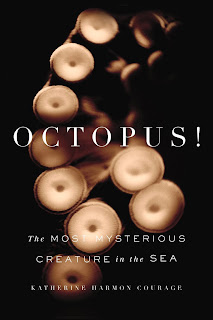Katherine Harmon Courage is the author of the new book Octopus!: The Most Mysterious Creature in the Sea. She is a contributing editor for Scientific American, and she lives in Colorado.
Q: What is it about the octopus that is so fascinating to
many people, and why did you decide to write this book?
The octopus is one of the strangest, most alluring animals.
If you saw one walking around on land in a Sci-Fi movie, you would think
"yeah, right." But here it is, right here on Earth. They just hide
well underneath the waves, so we have been slow to recognize them as such
incredible animals.
They have been a part of culture--culinary, art,
mythology--for thousands of years. But recently they have also been teaching us
some incredible things about science. For instance, they can camouflage using
color, light, and texture; but, from what we know, they are color blind. And
other than color vision, our eyes and their eyes have evolved to be almost
identical, despite our last common ancestor being a sightless sea worm that
lived at least 500 million years ago.
What finally drew me in and convinced me that I had to write
a book about the octopus was a recent study that showed that octopuses can
actually use tools. These squishy invertebrates were collecting coconut shell
halves in the wild and using them to make shelters when they felt threatened.
Needless to say, they have a lot to teach us about the emergence of
intelligence--in addition to other fields of science.
Q: What was the most surprising thing you learned in the course of researching your book?
Aside from their incredible (and mysterious) camouflaging
abilities and their stunning intelligence, I was very much struck by their
suckers. Each octopus usually has more than a thousand individual suckers, and
each one can be controlled individually. Perched on top of a movable stalk, a
sucker can rotate, open, pinch, and, of course, form a powerful seal. They can
also "taste" the water around them via chemosensors (imagine if you
could taste that apple slice you were holding!).
Individual suckers can also coordinate with one another.
Biologists I spoke with observed octopuses passing small objects up and down
their arms using only their suckers. They nicknamed this move the
"conveyer belt."
Q: You write about the intelligence of octopuses, as well as their tendency not to be social, and you state, "The octopus's dearth of these prosocial behaviors puts it at a considerable disadvantage for gaining easy esteem from humans." How have those two characteristics--intelligence and solitude--affected the octopus and scientists' ability to study them?
A: The octopus is obviously very different from the many
other "intelligent" animals we study--dolphins, dogs, chimpanzees,
whales, elephants. Not only are those animals all mammals and vertebrates, they
are also all extremely social. In fact, so much of what we think we know about
their intelligence comes from observing their social interactions: whales
talking to one another, dogs figuring out the group pecking order via play,
chimps teaching other chimps how to use tools.
But once all of this so easily recognizable (to us, at
least) complex behavior is off the table, as it is with the solitary (and often
cannibalistic) octopus, we are left looking more carefully for other behavioral
clues about intelligence. Although this is of course more difficult, it is also
good for science. It forces us to get out of our own social, mammal, vertebrate
heads and try to put ourselves more in the mind of the octopus. A fantastic and
refreshing challenge!
Q: Did you have a favorite among the locations you visited
to research the octopus?
A: I loved my time in the small Greek fishing village of
Gythio. The restaurants there along the harbor string the day's catch of
octopus above their front doors. Hardly anyone in the town spoke English, and
my Greek was even skimpier. But when I was able to strike up a basic
conversation, everyone was perplexed about why I would write a book about the
octopus. It had been such a common, simple staple, so integrated into daily
life for so many generations that an entire book dedicated to the octopus
seemed almost as mysterious as I found the animal itself to be. This deep
connection with the octopus was enchanting to me.
Q: What are you working on now?
A: I am still a contributing editor for Scientific
American magazine (where I keep the blog Octopus Chronicles) and have been writing
for WIRED, Popular Science, Gourmet and others, which keeps me plenty
busy. But I have been enthralled by research going on right now into the human
microbiota (the microbes that live in and on us that are turning out to be so
important for our health). I am also harboring a secret fascination with
fungus. I hope to be able to explore both more soon.
Q: Anything else we should know?
A: Well, octopus was actually an odd topic for me to tackle.
I grew up in landlocked Oklahoma and detested seafood for the first half of my
life. I certainly didn't meet an octopus until I was an adult. But in a way, I
think this perspective was an asset when researching and writing the book. I
was truly discovering the octopus as I went. Although, I had only nine months
to research and write the book--on top of a full-time job--so I guess you could
say I had to dive into the deep end. But I was lucky to have such a compelling
swimming companion. I still just cannot learn enough about the endlessly
amazing octopus.
--Interview with Deborah Kalb


No comments:
Post a Comment